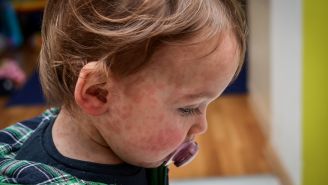Updated on September 26, 2024.
There are many different types of coughs—wet, dry, hoarse. And they can all seem worrisome, especially when they last for weeks, keep you up at night, or have a distinct sound. But that sound—among other things—can actually help you understand what’s causing it. And once you know the cause, you can take steps to treat it.
Here are two distinct coughs caused by very different infections. But both are very contagious, common in childhood, and tend to increase in the fall and winter.
Is it croup?
Sounds like: A harsh “barking” sound.
Other signs: Croup may also involve a stridor—a high-pitched whistle or vibrating sound when breathing in. Other symptoms may include:
- Hoarseness or laryngitis (no voice)
- A runny or stuff nose
- Fever
- Irritability and fatigue
Who gets it: Croup usually affects young children, between 3 months and 5 years old. This is because their airways are smaller. So, even a small amount of swelling can make it harder to breathe.
Caused by: Croup often results from a viral infection. Croup viruses include:
- Parainfluenza
- Influenza (the flu)
- Respiratory syncytial virus (RSV)
- Enteroviruses
- Adenovirus
How it spreads: Viruses that cause croup spread through the air in droplets when infected people cough, sneeze, or talk. People can also become infected if they touch a contaminated surface then touch their nose or mouth.
How to prevent it: There are vaccines to protect against the flu and RSV. Being immunized is the best way to avoid infection and related complications. Everyone ages 6 months and older (with very rare exceptions) should receive an annual flu vaccine.
In the U.S., there are also three RSV vaccines and two monoclonal antibody shots (lab-made proteins that mimic natural antibodies). One RSV vaccine dose is recommended for:
- All adults ages 75 and older
- Adults ages 60 to 74 who are at increased risk of severe RSV
- People who are 32 to 36 weeks pregnant (to prevent severe RSV in newborns)
One monoclonal antibody shot is recommended for:
- Babies born between October and March should get 1 dose by the time they are 1 week old.
- Babies born between April and September should get 1 dose before the start of their first RSV season (usually October).
- Some babies who are at high risk for serious illness from RSV may need another dose at the start of their second RSV season.
Some babies may not need this shot if their mother received the RSV vaccine at least 2 weeks before they were born.
The best time to be immunized against RSV is late summer or early fall. People do not need to get another dose every year. Talk to your healthcare provider (HCP) about what vaccine schedule is best for you.
Other ways to help stop the spread of viral infections that can cause croup:
- Wash your hands well and often with soap and water for at least 20 seconds. If there is no soap and water available, use an alcohol-based hand sanitizer.
- Avoid contact with anyone who is sick.
- Avoid touching your face (eyes, nose, or mouth) with unwashed hands.
- Routinely clean commonly touched surfaced, such as countertops, doorknobs, light switches, remove controls, and phones.
How to treat it: Mild croup can usually be managed at home. Children usually recover in 3 to 7 days. Some things you can do:
- Use a cool mist humidifier to help soothe dry and irritated airways
- Sit with a child in a steam-filled bathroom by running hot water in the shower
- Open a window and breathe in cool air
- Offer warm, clear fluids to loosen mucus in the throat
- Keep children with croup away from smoke and other irritants
More severe cases of croup may need additional, supportive treatment in a hospital emergency room or urgent care center. Warning signs of a medical emergency include:
- Troubling breathing or sucking in of the skin around the ribs or chest area when breathing in (this is also called retraction)
- A blue or gray tint to the skin
- Stridor (noisy breathing when inhaling)—even at rest
Is it whooping cough?
Sounds like: Very intense coughing spells that typically cause people to make a high-pitched whoop-like sound when they inhale or gasp for air.
Other signs or symptoms: Whooping cough typically has three stages, starting with a mild cough, runny nose, and low-grade fever. The symptoms are very similar to that of the common cold or flu. Once it progresses to the second stage people develop repeated, rapid coughing fits that may trigger vomiting and lead to exhaustion. During the final stage, people gradually begin to recover. The coughing fits become less frequent over the course of two to three weeks.
Who gets it: Anyone can get whooping cough. But young children at highest risk for complications due to their smaller airways.
Caused by: This very contagious respiratory illness is also known as pertussis. It is caused by a type of bacteria called Bordetella pertussis.
How it spreads: People with whooping cough can spread the infection through droplets when they cough, sneeze, or breathe. People can also become infected if they touch a contaminated surface then touch their nose or mouth.
How to prevent it: The best way to prevent whooping cough is to be vaccinated. There is a vaccine that is routinely given to kids and adults in the United States to protect them against pertussis—as well as diphtheria and tetanus. There are two versions of this vaccine, depending on how old you are:
DTaP: This vaccine is given to infants and young children. They receive five doses at the following ages:
- Dose 1: 2 months old
- Dose 2: 4 months old
- Dose 3: 6 months old
- Dose 4: Between 15 and 18 months old
- Dose 5: Between 4 and 6 years old
Tdap: This vaccine is given to older children and adults, usually starting at age 11 or 12. Pregnant people should also get this vaccine between the 27th and 36th week of pregnancy. Since this is a booster shot it contains lower doses of the diphtheria and pertussis vaccines. People need a Tdap booster every 10 years to maintain their immunity.
How to treat it: For those who do become infected, treatment with antibiotics, such as azithromycin and erythromycin, can help. Other ways to support recovery from whooping cough:
- Rest.
- Drink plenty of fluids to prevent dehydration.
- Use a cool-mist humidifier to ease breathing.
- Do not take over-the-counter cough remedies without asking an HCP about it first.
- Avoid smoke, dust, and other irritants that could trigger a coughing fit.







